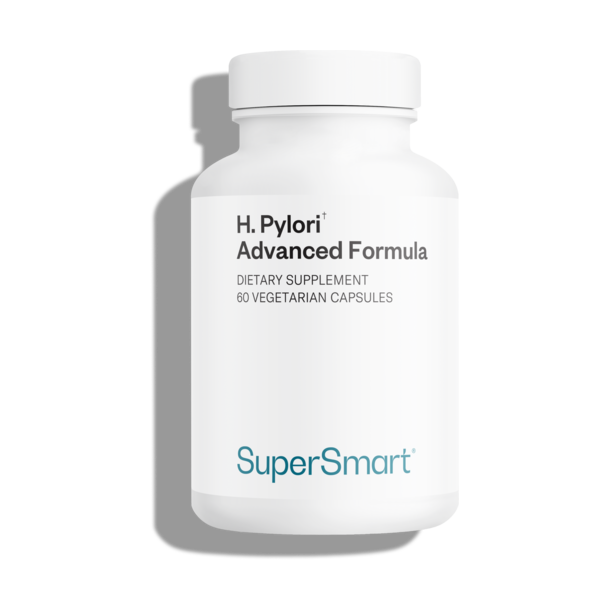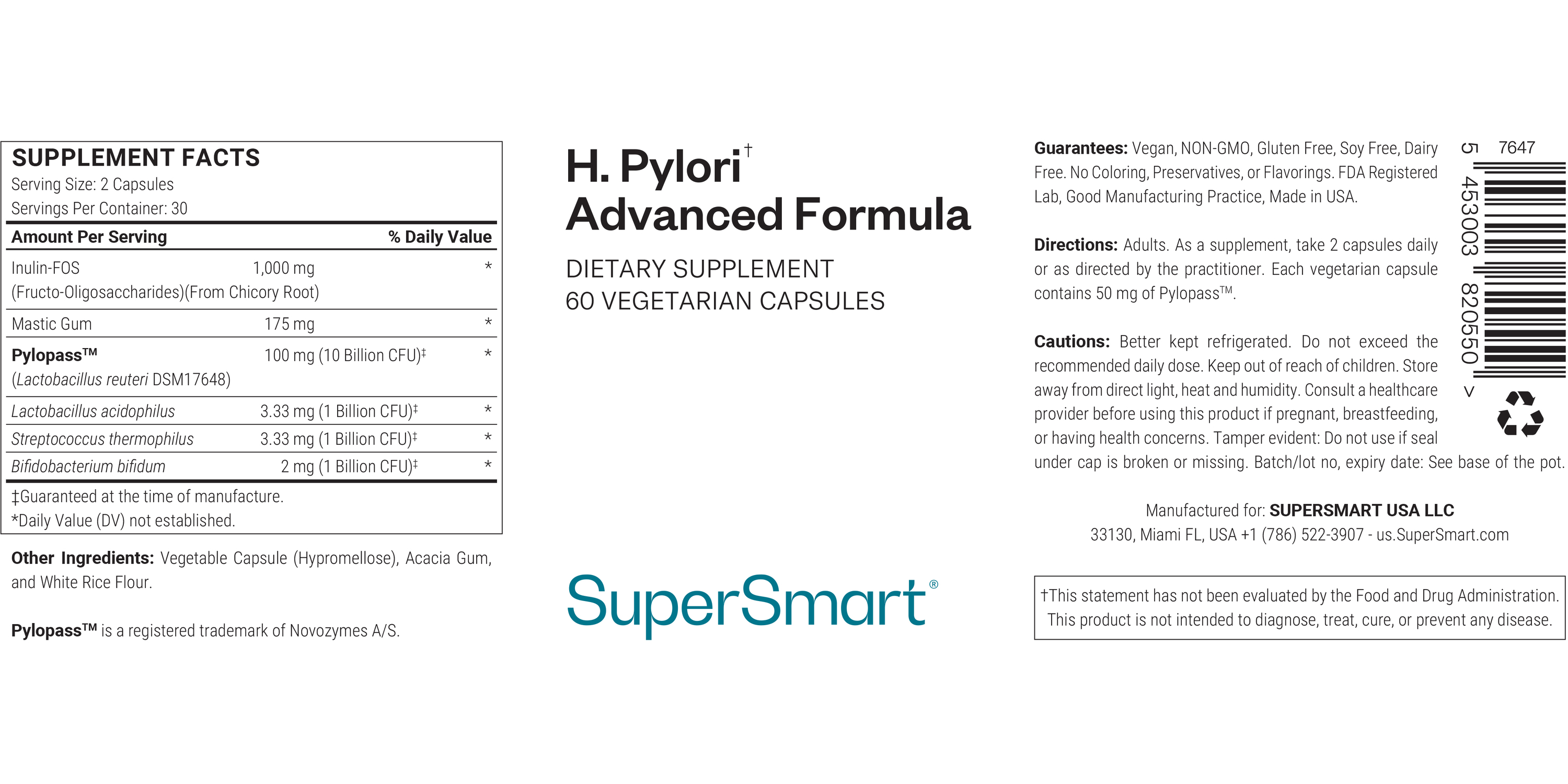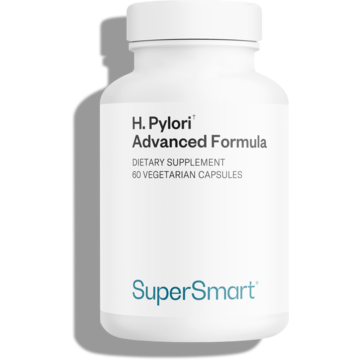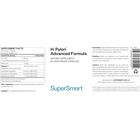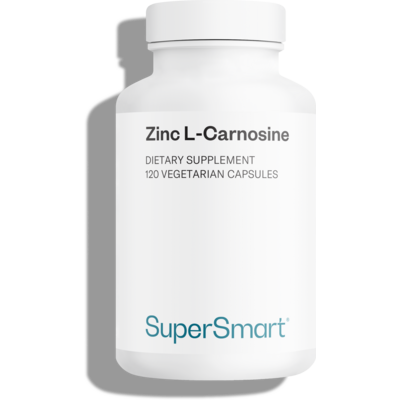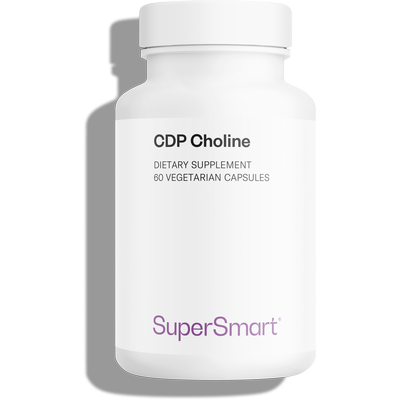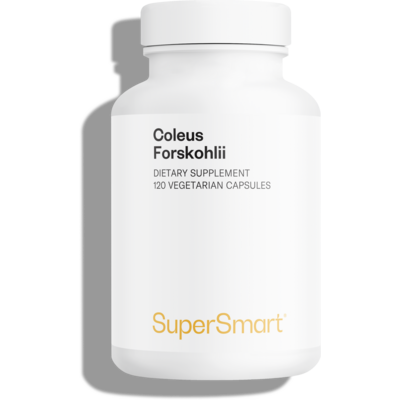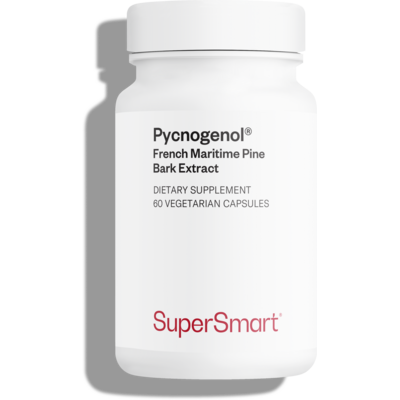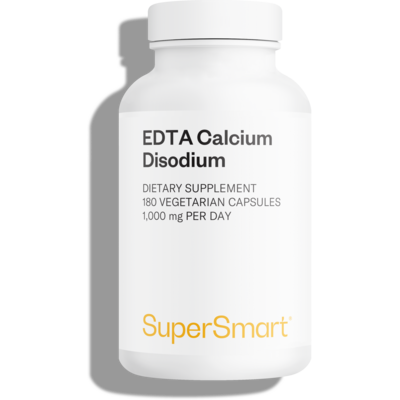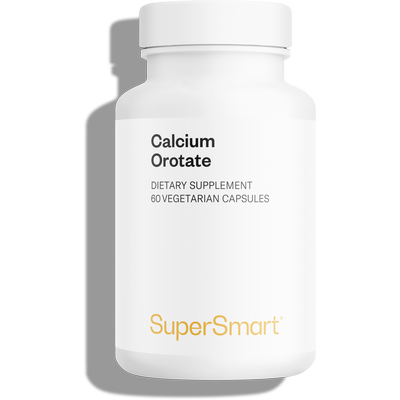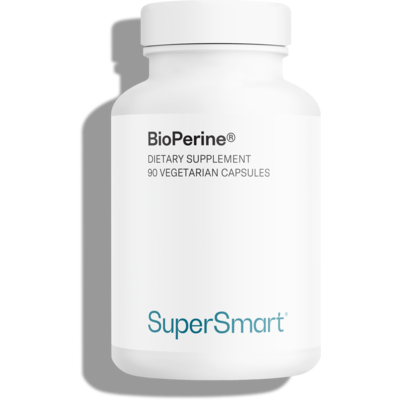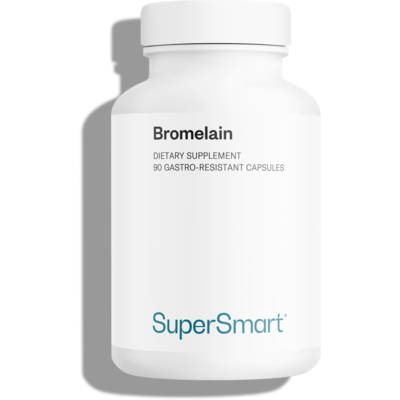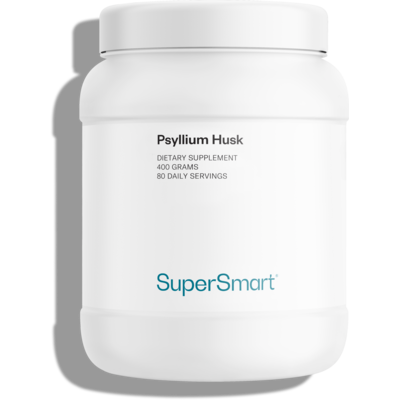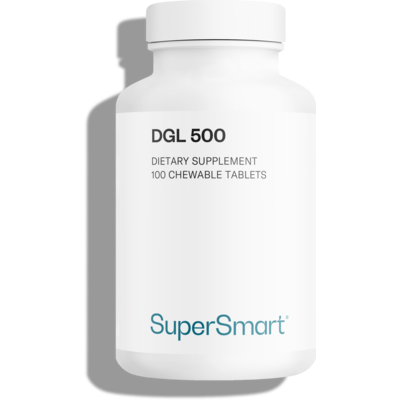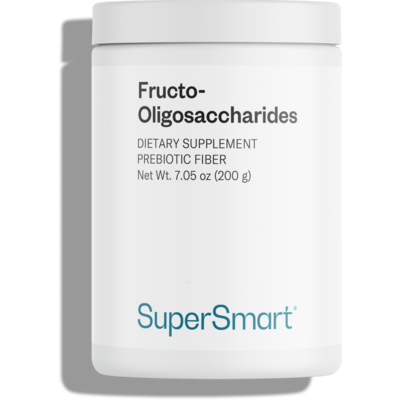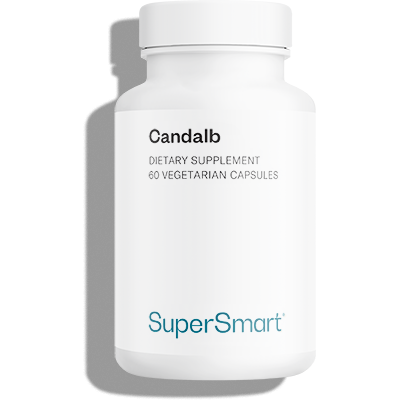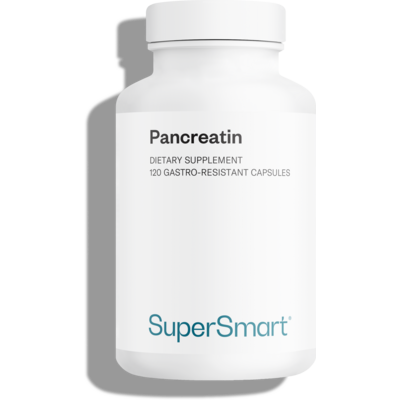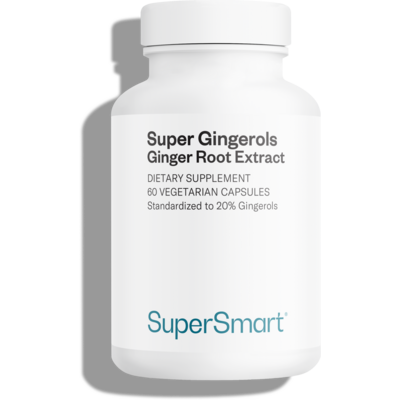Our H. Pylori Advanced Formula is a thoughtfully crafted supplement designed to support overall digestive wellness and help maintain a balanced gastrointestinal environment.*
It is part of our Digestive & Gut Health supplement category.
This blend features Pylopass™ postbiotic, three carefully selected probiotic strains, and complementary plant-based ingredients such as inulin and mastic gum, traditionally used to support digestive comfort and gut well-being.*
Science-Informed Supplement for Digestive Wellness and Microbiota Support*
This formula builds on our original digestive support blend by combining ingredients that have been studied for their potential to promote a balanced stomach environment and microbial harmony in the digestive tract.*
- Pylopass™ DSM17648: a patented postbiotic derived from inactivated Lactobacillus reuteri, studied for its potential role in supporting stomach environment balance.*
- Lactobacillus acidophilus: a lactic acid bacterium commonly found in fermented foods and researched for its potential role in supporting digestive health and microbial diversity.*
- Bifidobacterium bifidum: a probiotic strain that may help maintain gut flora balance and support digestive wellness.*
- Streptococcus thermophilus: a probiotic known for its traditional use in fermentation and studied for its role in supporting a healthy digestive environment.*
- Inulin: a natural prebiotic fiber sourced from plants like chicory, often used to nourish beneficial gut bacteria and support digestive regularity.*
- Mastic gum: a plant-derived resin traditionally used to support digestive comfort and help maintain gut lining integrity.*
What Is the Stomach Microbiota?*
The stomach microbiota refers to the community of microorganisms that may naturally reside in the gastric environment.* These microorganisms, including bacteria, may influence the local environment by interacting with stomach acidity and other digestive factors.*
This microbial ecosystem is thought to evolve over time and may be influenced by factors such as diet, age, and environmental exposure.* Supporting microbial balance in the digestive system is considered an important aspect of overall gut wellness.*
Other Supplements That May Complement Digestive Balance Advanced Formula*
To support your daily wellness routine, this formula may be paired with other supplements such as:*
- DGL 500: a deglycyrrhizinated licorice root supplement that may help support natural mucus production and occasional gastric comfort.*
- Zinc L-Carnosine: a mineral-peptide complex that might offer gentle support for maintaining cellular balance.*
- Super Curcuma: a turmeric extract valued for its bioavailability and traditional use in digestive wellness.*
WARNINGS
Do not exceed the recommended daily dose. This product is a nutritional supplement and should not be used as a substitute for a varied and balanced diet or a healthy lifestyle.
STORAGE
Store in a cool, dry place away from direct sunlight, heat, and humidity.
Keep out of reach of children.
PREGNANCY AND MEDICAL CONDITIONS
If you are pregnant, breastfeeding, or have any medical conditions, consult your healthcare provider before using this product.
SUPPLEMENT INTERACTIONS
Consult your healthcare provider before use, especially if you are taking any medications or other supplements as there may be potential interactions.
*These statements have not been evaluated by the Food and Drug Administration. This product is not intended to diagnose, treat, cure, or prevent any disease.
Serving Size: 2 Capsules
Servings Per Container: 30 |
Amount Per Serving |
Inulin-FOS
(Fructo-Oligosaccharides) (From Chicory Root) |
1,000 mg |
| Mastic Gum |
175 mg |
Pylopass™
(Lactobacillus reuteri DSM17648) |
100 mg (10 Billion CFU) |
| Lactobacillus acidophilus |
3.33 mg (1 Billion CFU) |
| Streptococcus thermophilus |
3.33 mg (1 Billion CFU) |
| Bifidobacterium bifidum |
2 mg (1 Billion CFU) |
Other Ingredients: Vegetable Capsule (Hypromellose), Acacia Gum, and White Rice Flour.
Pylopass™ is a registered trademark of Novozymes A/S. |
Serving size: Take 2 capsules a day. Each vegetarian capsule contains 50 mg of Pylopass™.
Servings per container: 30
Storage: Store away from direct light, heat, and humidity.
Cautions: For adults only. Do not exceed the recommended daily dose. Keep out of reach of children. Consult a healthcare provider before taking this supplement and if you are pregnant, breastfeeding, or having health concerns.*
This product is a dietary supplement and should not be used as a substitute for a varied, balanced diet and a healthy lifestyle.
- Buckley M, Lacey S, Doolan A, Goodbody E, Seamans K. … Lactobacillus reuteri supplementation in Helicobacter pylori…: a placebo-controlled, single-blind study. BMC Nutr. 2018 Dec 7;4:48. doi: 10.1186/s40795-018-0257-4. PMID: 32153909; PMCID: PMC7050722.
- Yang YJ, Chuang CC, Yang HB, Lu CC, Sheu BS. Lactobacillus acidophilus … by inactivating the Smad7 and NFκB pathways. BMC Microbiol. 2012 Mar 19;12:38. doi: 10.1186/1471-2180-12-38. PMID: 22429929; PMCID: PMC3340303.
- Asgari B, Kermanian F, Hedayat Yaghoobi M, Vaezi A, Soleimanifar F, Yaslianifard S. …Lactobacillus acidophilus, L. plantarum, and L. rhamnosus in Stomach Tissue of C57BL/6 Mice. Visc Med. 2020 Apr;36(2):137-143. doi: 10.1159/000500616. Epub 2019 May 14. PMID: 32356850; PMCID: PMC7184849.
- Shirasawa Y, Shibahara-Sone H, Iino T, Ishikawa F. Bifidobacterium bifidum BF-1 …. J Dairy Sci. 2010 Oct;93(10):4526-34. doi: 10.3168/jds.2010-3274. PMID: 20854986.
- Shibahara-Sone H, Gomi A, Iino T, Kano M, Nonaka C, Watanabe O, Miyazaki K, Ohkusa T. Living cells of probiotic Bifidobacterium bifidum YIT 10347 detected on … . Benef Microbes. 2016 Jun;7(3):319-26. doi: 10.3920/BM2015.0138. Epub 2016 Mar 1. PMID: 26925600.
- Marcial G, Villena J, Faller G, Hensel A, de Valdéz GF. … Helicobacter pylori …. 2017 May 30;8(3):451-461. doi: 10.3920/BM2016.0186. Epub 2017 May 15. PMID: 28504579.
- Hughes RL, Alvarado DA, Swanson KS, Holscher HD. … inulin-Type Fructans: A Systematic Review. Adv Nutr. 2022 Mar;13(2):492-529. doi: 10.1093/advances/nmab119. Epub 2023 Feb 10. PMID: 34555168; PMCID: PMC8970830.
- Paraschos S, Magiatis P, Mitakou S, Petraki K, Kalliaropoulos A, Maragkoudakis P, Mentis A, Sgouras D, Skaltsounis AL. In vitro and in vivo activities of Chios mastic gum extracts and constituents …. 2007 Feb;51(2):551-9. doi: 10.1128/AAC.00642-06. Epub 2006 Nov 20. PMID: 17116667; PMCID: PMC1797732.
- de Brito BB, da Silva FAF, Soares AS, Pereira VA, Santos MLC, Sampaio MM, Neves PHM, de Melo FF. …. World J Gastroenterol. 2019 Oct 7;25(37):5578-5589. doi: 10.3748/wjg.v25.i37.5578. PMID: 31602159; PMCID: PMC6785516.
- Mobley HL, Hu LT, Foxal PA. Helicobacter pylori … : properties and role …. Scand J Gastroenterol Suppl. 1991;187:39-46. PMID: 1775923.
- Parikh NS, Ahlawat R. Helicobacter Pylori. [Updated 2023 Aug 8]. In: StatPearls [Internet]. Treasure Island (FL): StatPearls Publishing; 2023 Jan-. Available from: https://www.ncbi.nlm.nih.gov/books/NBK534233/
- Azer SA, Awosika AO, Akhondi H. …. [Updated 2023 Oct 30]. In: StatPearls [Internet]. Treasure Island (FL): StatPearls Publishing; 2023 Jan-. Available from: https://www.ncbi.nlm.nih.gov/books/NBK544250/
- Öztekin M, Yılmaz B, Ağagündüz D, Capasso R. Overview of Helicobacter pylori …: Clinical Features, …, and Nutritional Aspects. …. 2021 Sep 23;9(4):66. …. PMID: 34698140; PMCID: PMC8544542.
- Narayanan M, Reddy KM, Marsicano E. …. Mo Med. 2018 May-Jun;115(3):219-224. PMID: 30228726; PMCID: PMC6140150.
- Wroblewski LE, Peek RM Jr, Wilson KT. …. Clin Microbiol Rev. 2010 Oct;23(4):713-39. doi: 10.1128/CMR.00011-10. PMID: 20930071; PMCID: PMC2952980.
- Raj P, Thompson JF, Pan DH. … a useful … screening tool for … inner city children. Acta Paediatr. 2017 Mar;106(3):470-477. doi: 10.1111/apa.13724. Epub 2017 Jan 20. PMID: 28024098; PMCID: PMC5303165.
- Sankararaman S, Moosavi L. …. [Updated 2022 Aug 8]. In: StatPearls [Internet]. Treasure Island (FL): StatPearls Publishing; 2023 Jan-. Available from: https://www.ncbi.nlm.nih.gov/books/NBK542286/
- Mégraud F, Lehours P. Helicobacter pylori …. Clin Microbiol Rev. 2007 Apr;20(2):280-322. doi: 10.1128/CMR.00033-06. PMID: 17428887; PMCID: PMC1865594.
- Goderska K, Agudo Pena S, Alarcon T. Helicobacter pylori … probiotics. Appl Microbiol Biotechnol. 2018 Jan;102(1):1-7. doi: 10.1007/s00253-017-8535-7. Epub 2017 Oct 26. PMID: 29075827; PMCID: PMC5748437.
- Khien VV, Thang DM, Hai TM, Duat NQ, Khanh PH, Ha DT, Binh TT, Dung HDQ, Trang TTH, Yamaoka Y. …: Perspectives from Vietnam. Gut Liver. 2019 Sep 15;13(5):483-497. doi: 10.5009/gnl18137. PMID: 31009957; PMCID: PMC6743798.
- Jalilzadeh-Amin G, Najarnezhad V, Anassori E, Mostafavi M, Keshipour H. …. Iran J Pharm Res. 2015 Fall;14(4):1163-70. PMID: 26664383; PMCID: PMC4673944.
- Skrovanek S, DiGuilio K, Bailey R, Huntington W, Urbas R, Mayilvaganan B, Mercogliano G, Mullin JM. Zinc …. World J Gastrointest … . 2014 Nov 15;5(4):496-513. doi: 10.4291/wjgp.v5.i4.496. PMID: 25400994; PMCID: PMC4231515.
- Kwiecien S, Magierowski M, Majka J, Ptak-Belowska A, Wojcik D, Sliwowski Z, Magierowska K, Brzozowski T. Curcumin: A Potent …. Int J Mol Sci. 2019 Mar 24;20(6):1477. doi: 10.3390/ijms20061477. PMID: 30909623; PMCID: PMC6471759.

